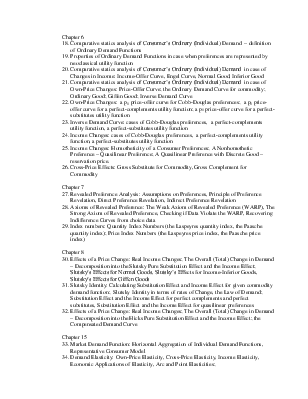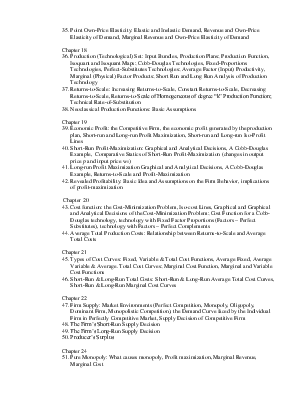Examination topics for the course “Microeconomics-2”
Spring semester 2009
Introduction
- Economic Modeling: Economic Modeling
Assumptions: Optimality Principle and Equilibrium Principle; Comparative
Statics Analysis, Pareto Efficiency
- Limited Resource: Rationality in
Economics, Opportunity Cost
- Method of Lagrange multipliers
Chapter 2
- Consumption Choice Sets: Budget
Constraints, General Choice Sets
- Budget Constraints: Budget Constraints -
Income Changes, Budget Constraints - Price Changes, Budget Constraints -
Relative Prices
- Budget Constraints: Uniform Ad
Valorem Sales Taxes, The Food Stamp Program
- Shapes of Budget Constraints: Shapes of
Budget Constraints - Quantity Discounts, Shapes of Budget Constraints -
One Price Negative
Chapter 3
- Preference Relations: Formal Definition
of Binary Relation, Assumptions about Preference Relations, Rationality of
Preference Relations, Continuity of Preference Relations
- Preference Relation Based Indifference
Curves: Indifference Curves Properties, Slopes of Indifference Curves
- Indifference Curves: Perfect Substitutes,
Perfect Complements, Preferences Exhibiting Satiation, Infinitely
Divisible and Discrete Commodities
- Well-Behaved Preferences: Monotonicity
and Convexity, Weak Convexity, Non-Convex Preferences
- Slopes of Indifference Curves: Marginal
Rate of Substitution, Marginal Rate of Substitution and Indifference Curve
Properties
Chapter 4
- Utility Function: Formal Definition, A
Theorem on Existence of Utility Function Representing Preference Relation,
An Ordinal and Cardinal Utility, Examples of Utility Functions, Monotonic
Transformations of Utility Function
- Utility Functions and Indifference Curves:
Indifference Curves from Utility, Indifference Map, Examples: Perfect
Substitutes, Perfect Complements, Quasilinear Preferences, Cobb-Douglas
Preferences
- Marginal Utility: Formal Definitions, Marginal
Utility and Marginal Rate of Substitution, Examples: Perfect Substitutes,
Perfect Complements, Quasilinear Preferences, Cobb-Douglas Preferences; Monotonic
Transformations and Marginal Rates-of-Substitution
Chapter 5
- Consumer Choice: Economic Rationality, Rational
Constrained Choice: Analytical and Graphical Presentations of the Problem;
Consumer Choice Optimality Conditions; Optimality Conditions for: Perfect
Substitutes, Perfect Complements, Quasilinear Preferences, Cobb-Douglas
Preferences
- Consumer’s Ordinary (Individual) Demand:
Formal Definition, Interior and Corner Solutions, Properties of the Consumer’s
Ordinary (Individual) Demand; Computation of Ordinary (Individual) Demand:
Examples of Internal (Cobb-Douglas Preferences, Perfect Complements),
Corner (Perfect Substitutes, the Non-Convex Preferences Case) and ‘Kinky’
Solutions (Perfect Complements)
Chapter 6
- Comparative statics analysis of
Consumer’s Ordinary (Individual) Demand – definition of Ordinary Demand Functions
- Properties of Ordinary Demand Functions
in case when preferences are represented by neoclassical utility function
- Comparative statics analysis of
Consumer’s Ordinary (Individual) Demand in case of Changes in Income:
Income-Offer Curve, Engel Curve, Normal Good, Inferior Good
- Comparative statics analysis of
Consumer’s Ordinary (Individual) Demand in case of Own-Price Changes:
Price-Offer Curve; the Ordinary Demand Curve for commodity; Ordinary Good;
Giffen Good; Inverse Demand Curve
- Own-Price Changes: a p1
price-offer curve for Cobb-Douglas preferences; a p1
price-offer curvefor a perfect-complements utility function; a p1
price-offer curvefor a perfect-substitutes utility function
- Inverse Demand Curve: cases of Cobb-Douglas
preferences, a perfect-complements utility function, a
perfect-substitutes utility function
- Income Changes: cases of Cobb-Douglas
preferences, a perfect-complements utility function, a
perfect-substitutes utility function
- Income Changes: Homotheticity of a
Consumer Preferences; A Nonhomothetic Preference – Quasilinear
Preference; A Quasilinear Preference with Discrete Good – reservation
price.
- Cross-Price Effects: Gross Substitute for
Commodity, Gross Complement for Commodity


